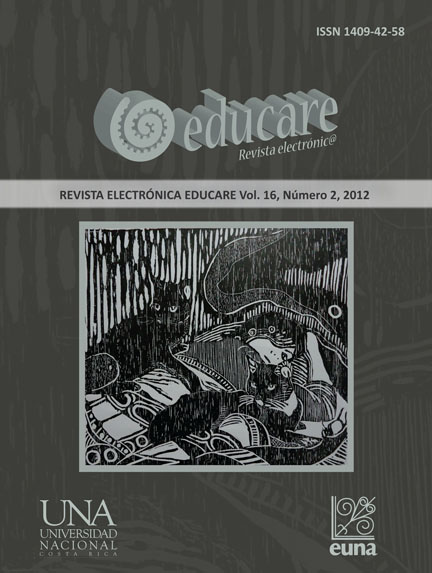Learning Process in Teaching and Bio-pedagogical Knowledge Building
DOI:
https://doi.org/10.15359/ree.16-2.5Keywords:
Learning process, bio-pedagogy, systematization, teaching.Abstract
Bio-pedagogy is built on praxis, i.e. the interrelationship between reflection and innovative action where these two merge in the construction of senses to generate knowledge. Then, the following question arises: How is teaching understood? How can practice be renovated from the action-reflection-action in a recurring manner and in life itself? A way to search for those answers is the systematization of experiences –a modality of qualitative research. It promotes the transformation of a common practice, based on knowledge building by holistic approaches to the educational process complexity. The systematization of bio-pedagogical experiences involves self-organization, joy, uncertainty and passion; it respects freedom and autonomy, and generates relational spaces, which promote creative processes in learning.References
Assmann, H. (2002). Placer y ternura en la educación. Hacia una sociedad aprendiente Madrid:
Narcea.
Boff, L. (2001). Cuidar la Tierra. Hacia una ética universal. México: Dabar.
Flores, L.E., Flores, G., Jiménez, R., Madrigal. J. C. y Perearnau,
M. A. (2009). Comunidad aprendiente.
San José, Costa Rica: Artemusa.
Freire, P. (2003). El grito manso. Buenos Aires: Siglo XXI.
Maturana, H. (1999). Transformación en la convivencia. Chile: Dolmen Ediciones.
Morin, E., Roger, E. y Motta, R. D. (2003). Educar en la era planetaria. España: Gedisa.
Pérez, A. (agosto, 2009). Re-pensar la sistematización y la investigación evaluativa en la
intervención del trabajo social, como pilares para la producción de conocimiento.
Palabra, 10, 42-56.Recuperado de http://aula.tcomunica.org/wp-content/uploads/2009/03/
art%C3%ADculo-Alexander-Pérez-Álvarez.pdf
Sánchez, A. (febrero-mayo, 2010). El artículo sistematización de experiencias: Construcción de
sentido desde una perspectiva crítica. Revista Virtual Universidad Católica del Norte, 29, 1-7.
Recuperado de http://redalyc.uaemex.mx/redalyc/pdf/1942/194214466001.pdf
Downloads
Published
How to Cite
Issue
Section
License
1. In case the submitted paper is accepted for publication, the author(s) FREELY, COSTLESS, EXCLUSIVELY AND FOR AN INDEFINITE TERM transfer copyrights and patrimonial rights to Universidad Nacional (UNA, Costa Rica). For more details check the Originality Statement and Copyright Transfer Agreement
2. REUTILIZATION RIGHTS: UNA authorizes authors to use, for any purpose (among them selfarchiving or autoarchiving) and to publish in the Internet in any electronic site, the paper´'s final version, both approved and published (post print), as long as it is done with a non commercial purpose, does not generate derivates without previous consentment and recognizes both publisher's name and authorship.
3. The submission and possible publication of the paper in the Educare Electronic Journal is ruled by the Journal’s editorial policies, the institutional rules of Universidad Nacional and the laws of the Republic of Costa Rica. Additionally, any possible difference of opinion or future dispute shall be settled in accordance with the mechanisms of Alternative Dispute Resolution and the Costa Rican Jurisdiction.
4. In all cases, it is understood that the opinions issued are those of the authors and do not necessarily reflect the position and opinion of Educare, CIDE or Universidad Nacional, Costa Rica. It is also understood that, in the exercise of academic freedom, the authors have carried out a rogorous scientific-academic process of research, reflection and argumentation thar lays within the thematic scope of interest of the Journal.
5. The papers published by Educare Electronic Journal use a Creative Commons License:














 The articles published by Educare Electronic Journal can be shared with a Creative Commons License:
The articles published by Educare Electronic Journal can be shared with a Creative Commons License: 



